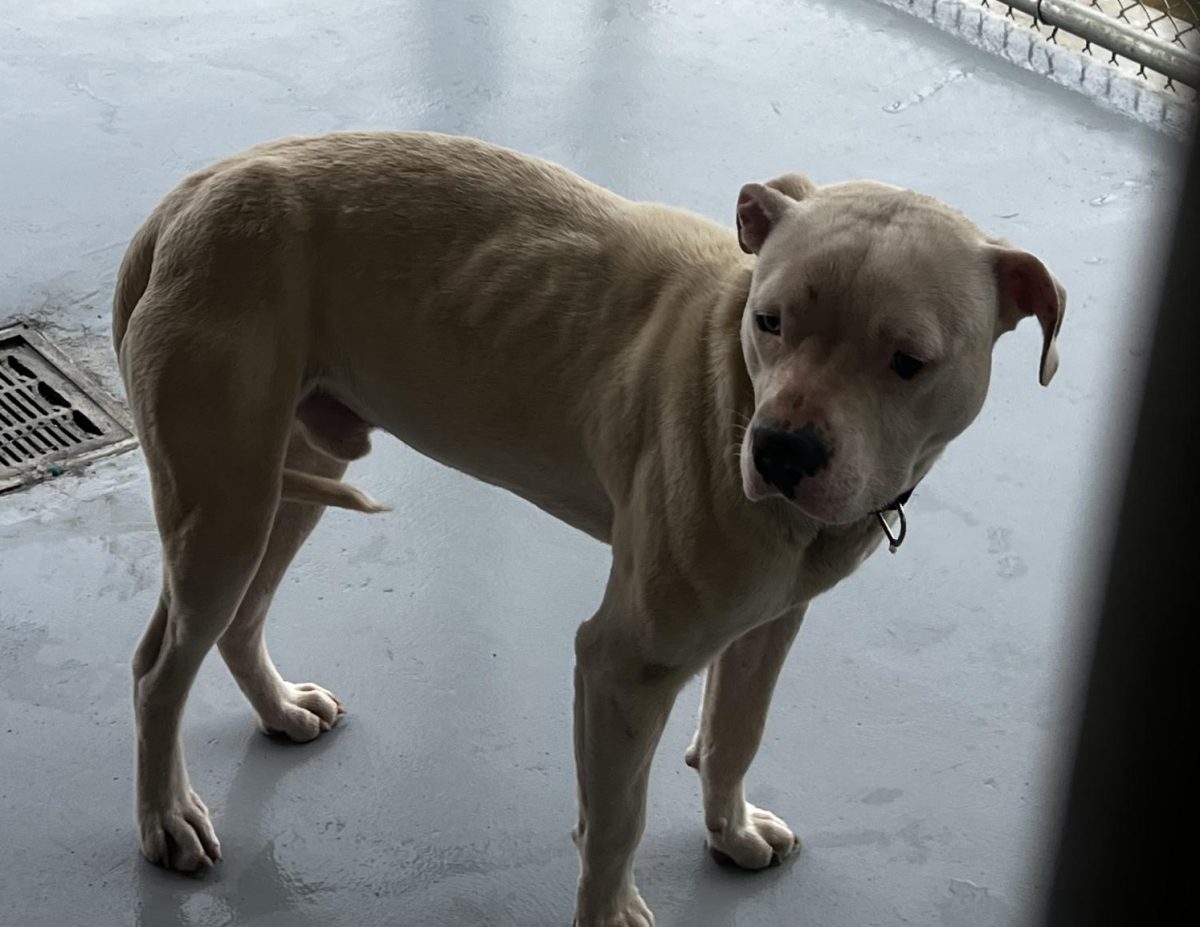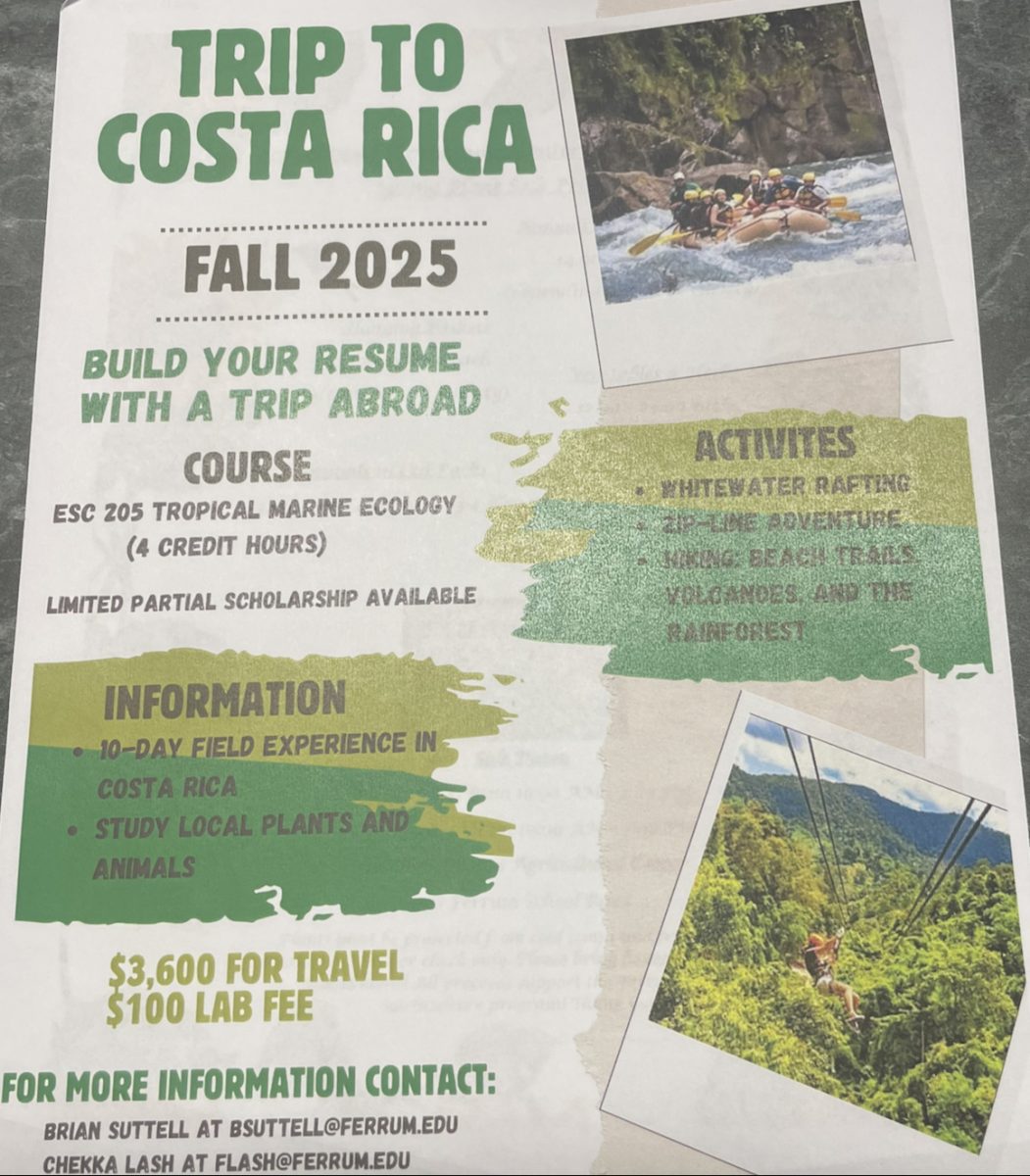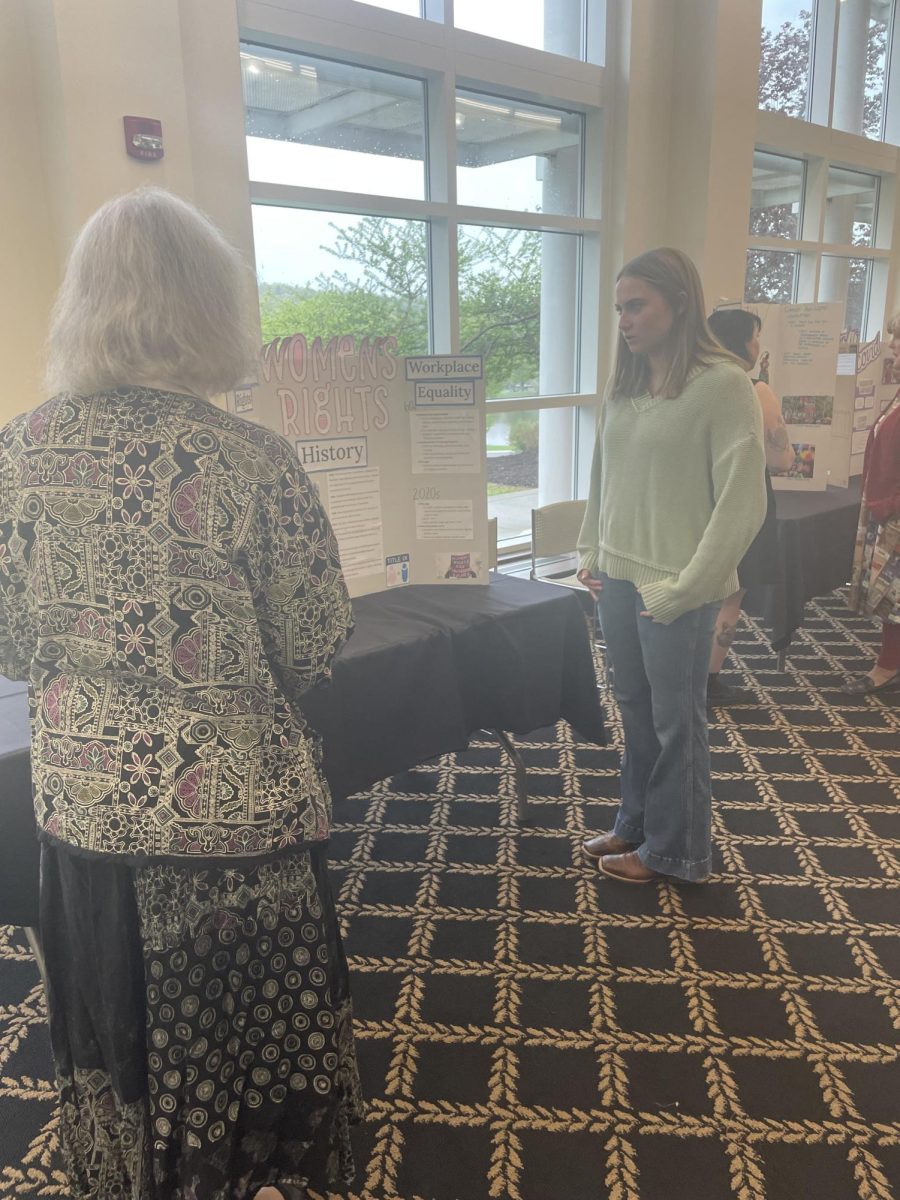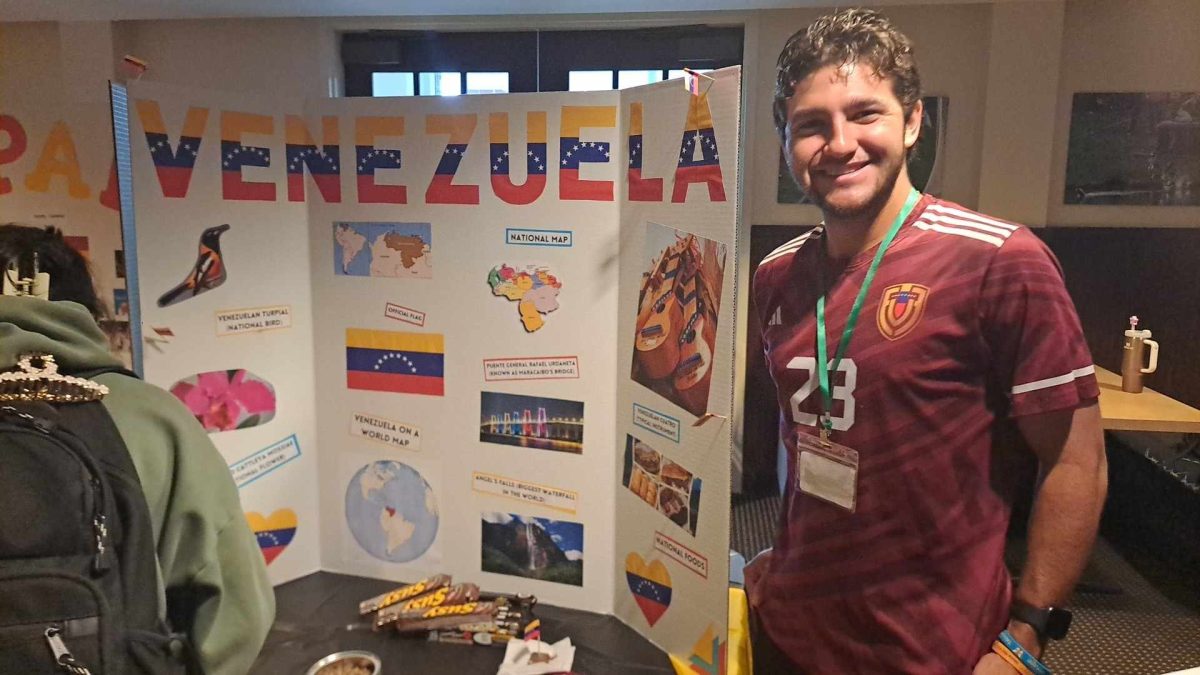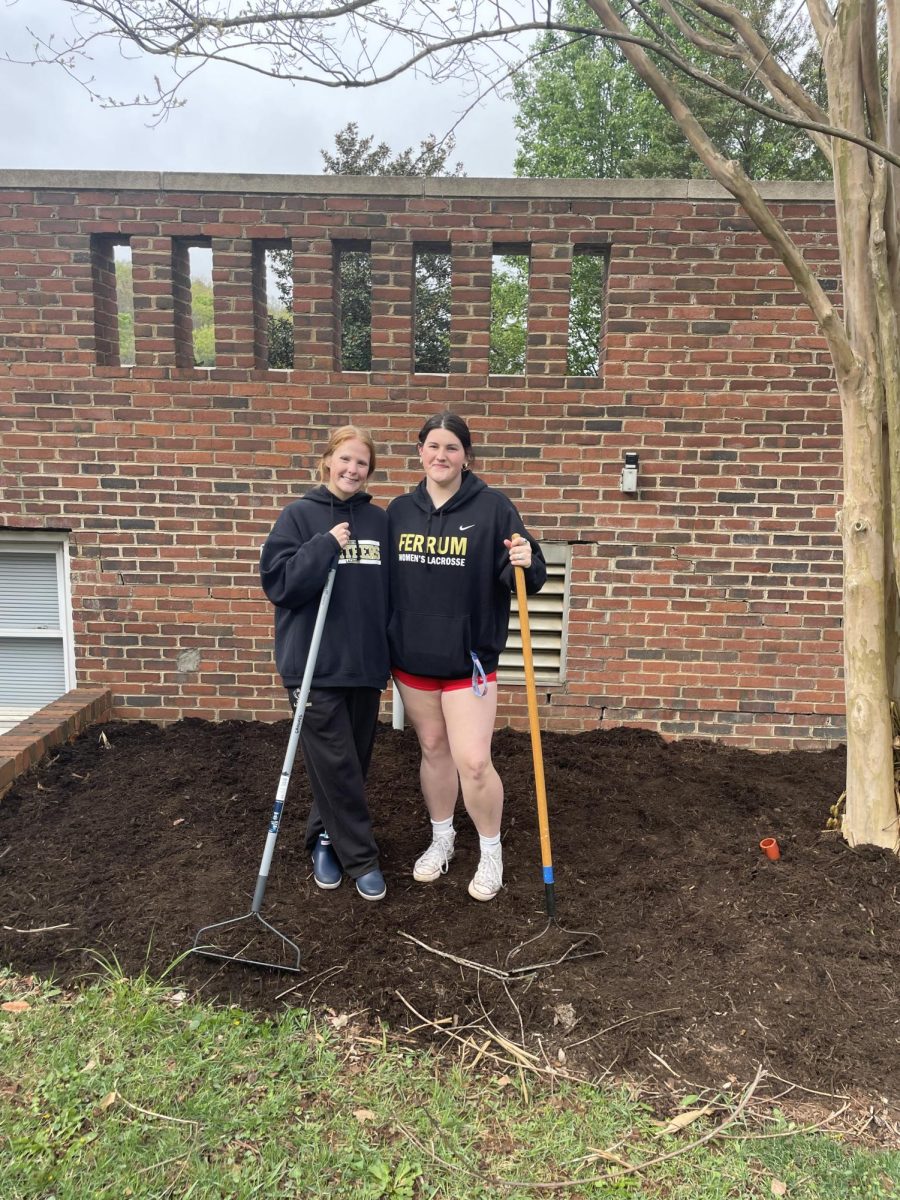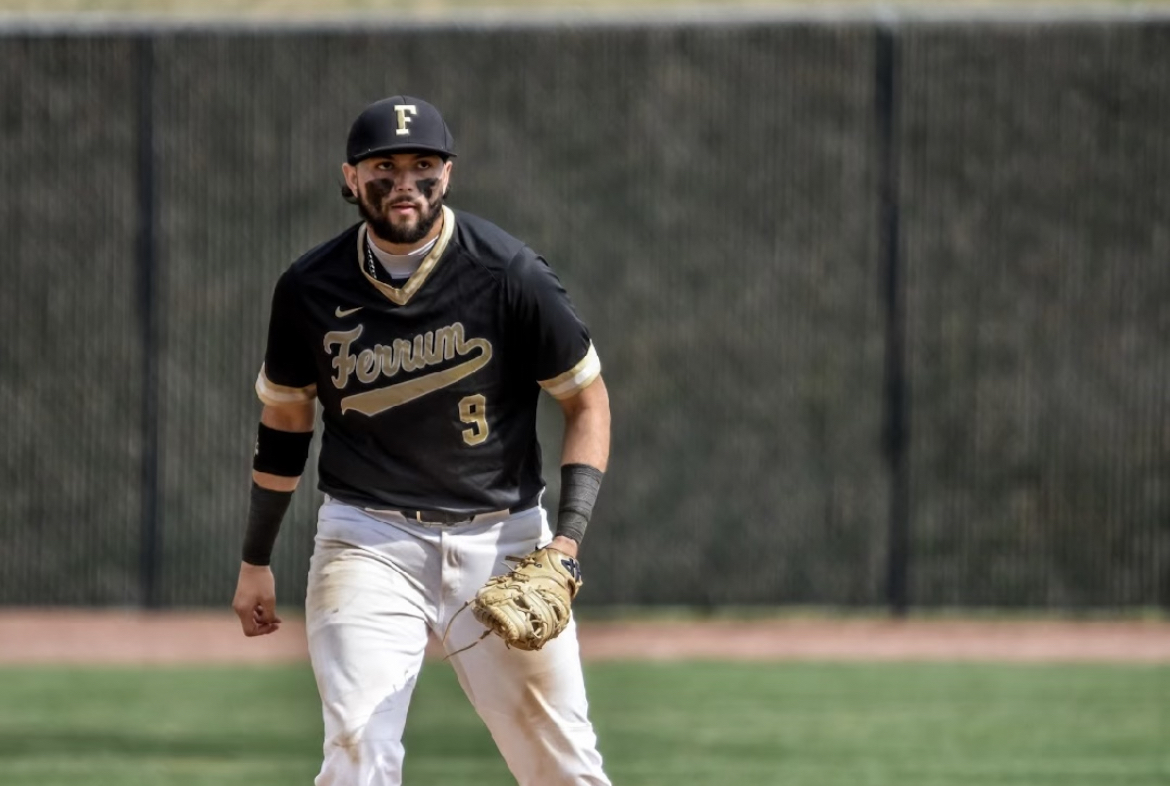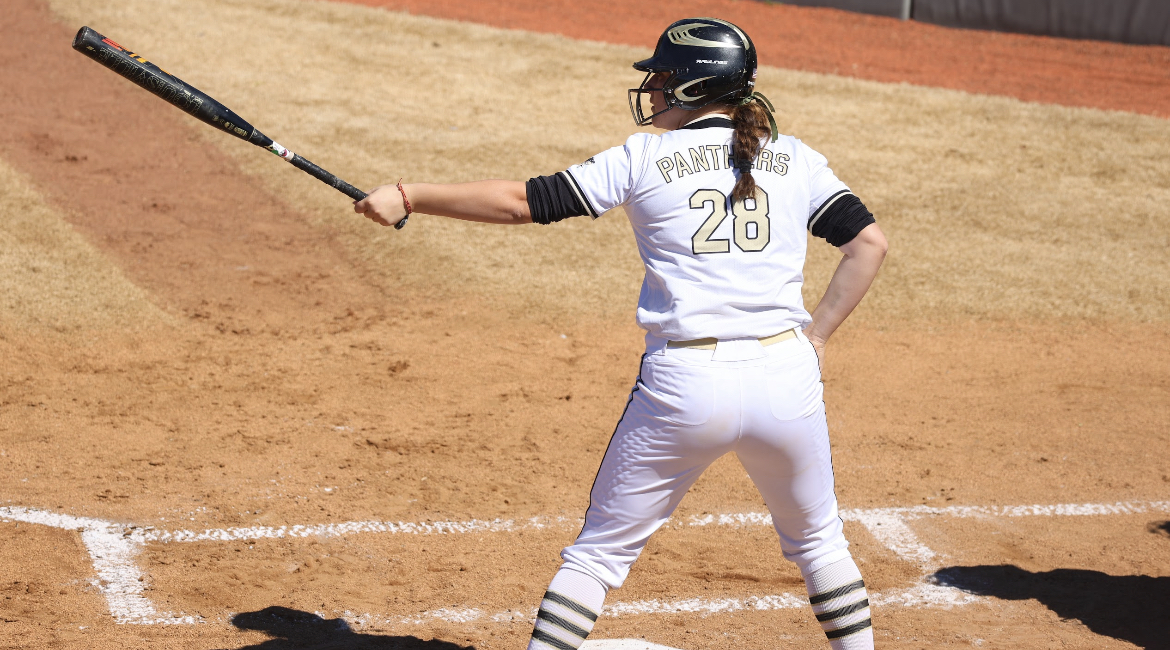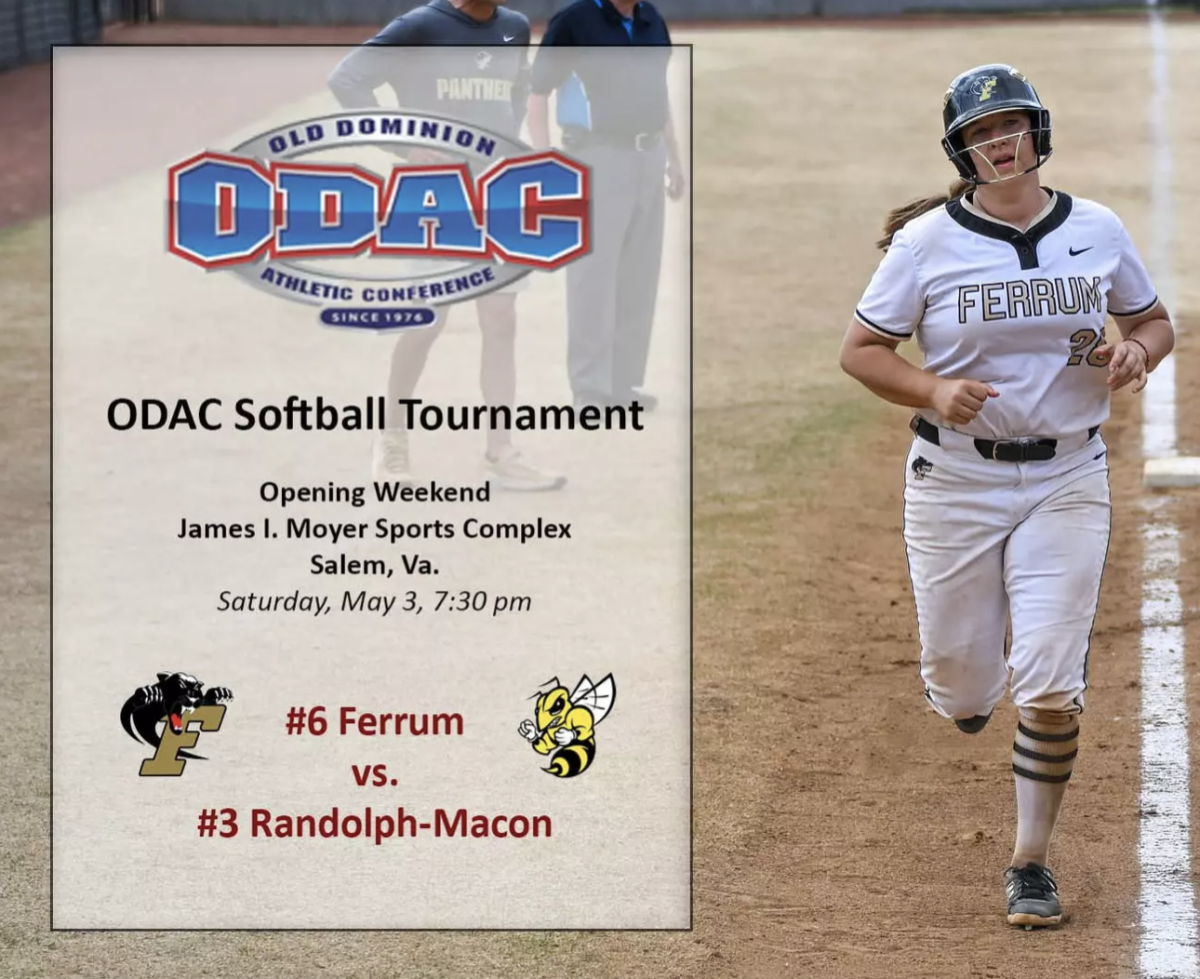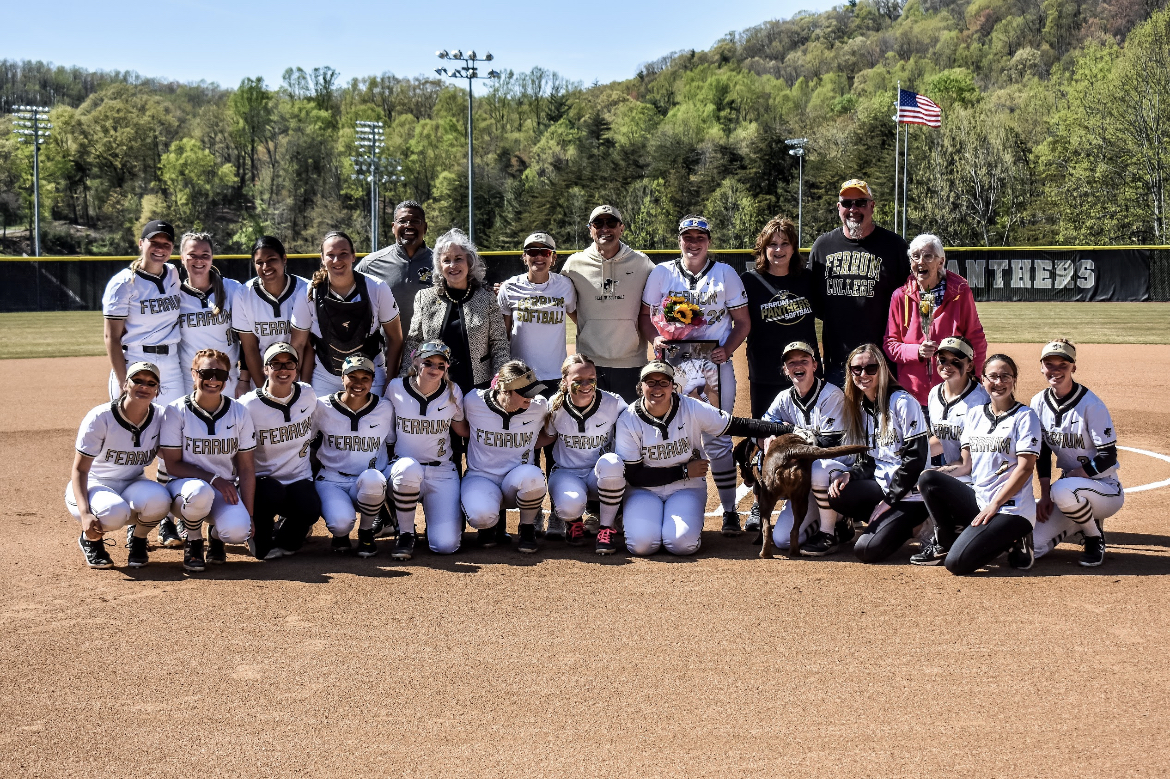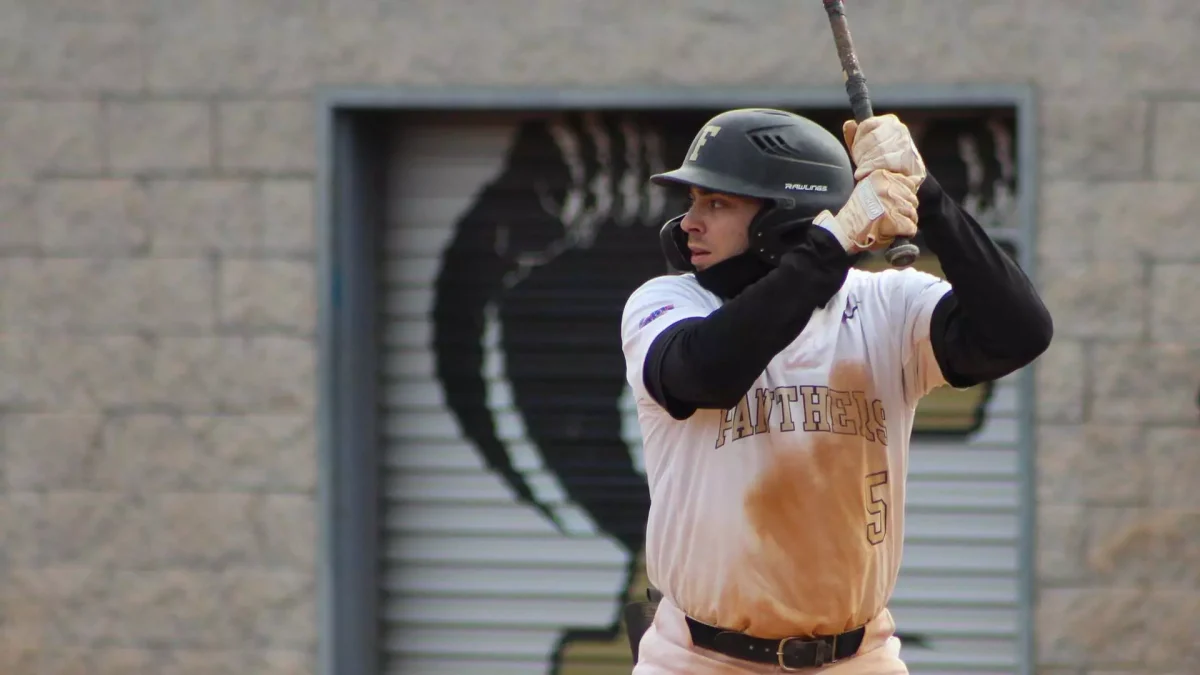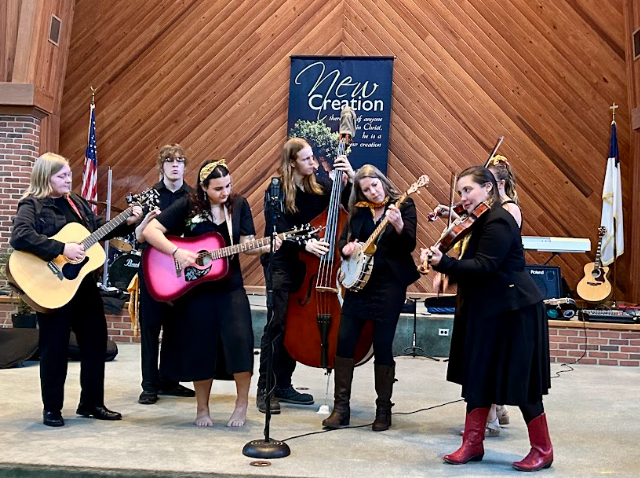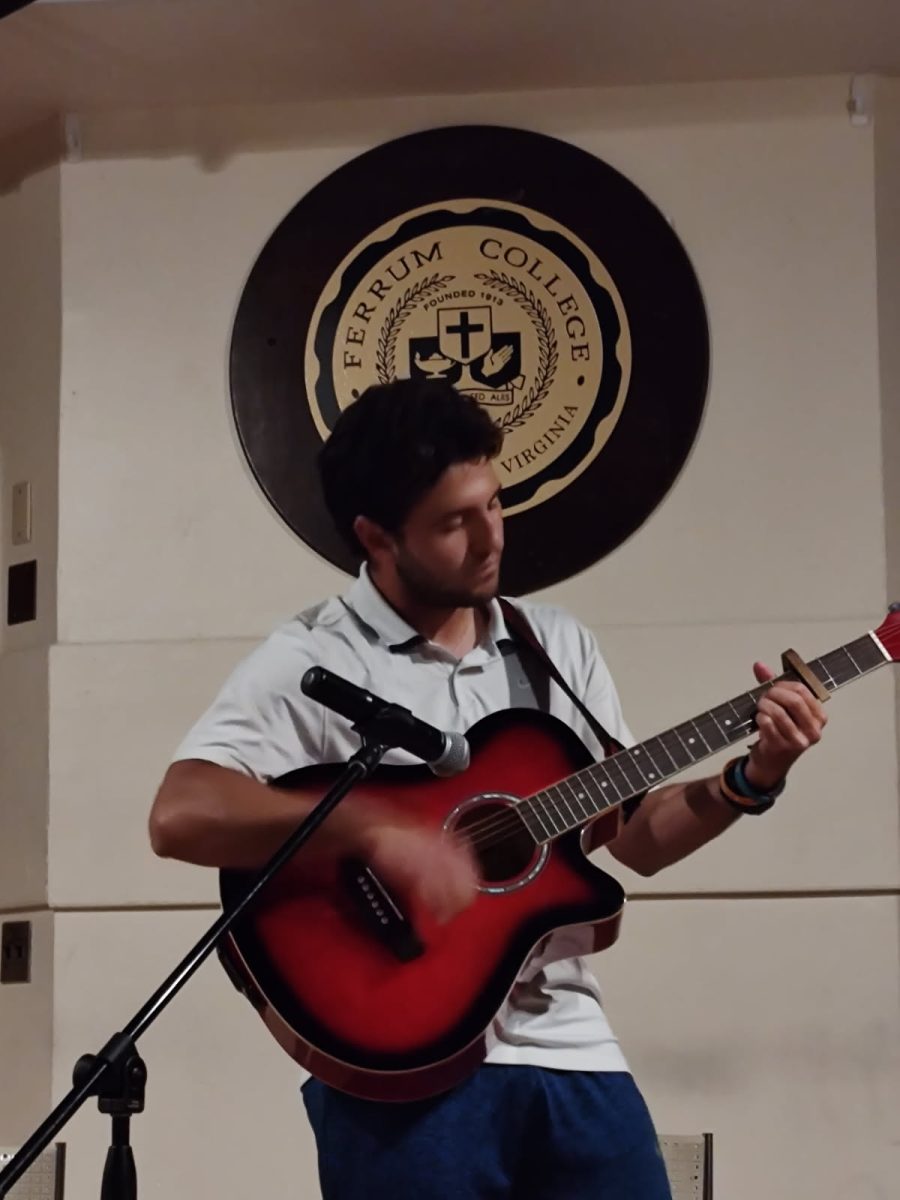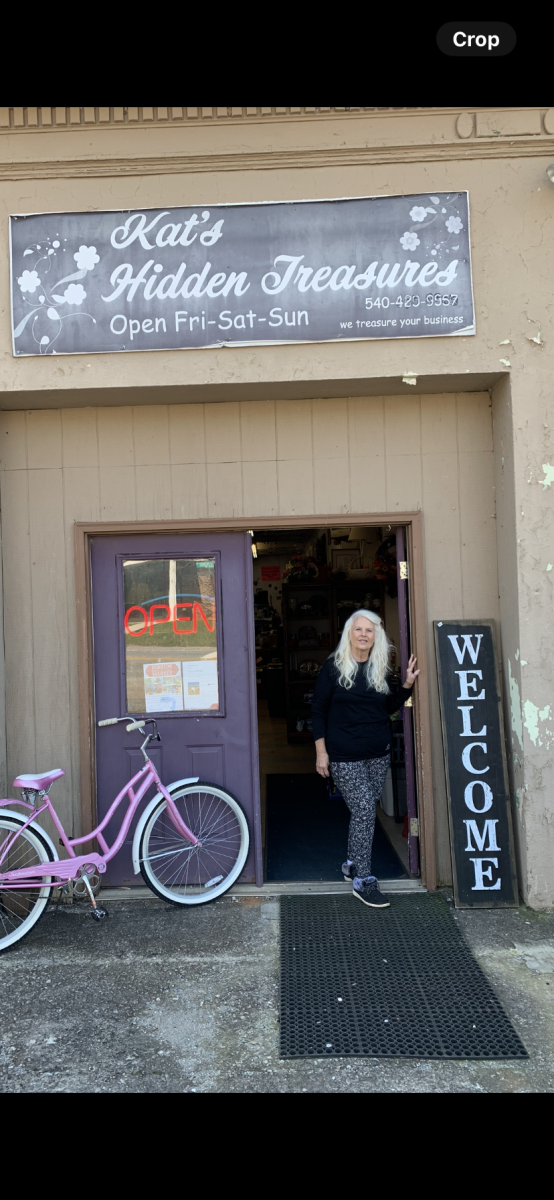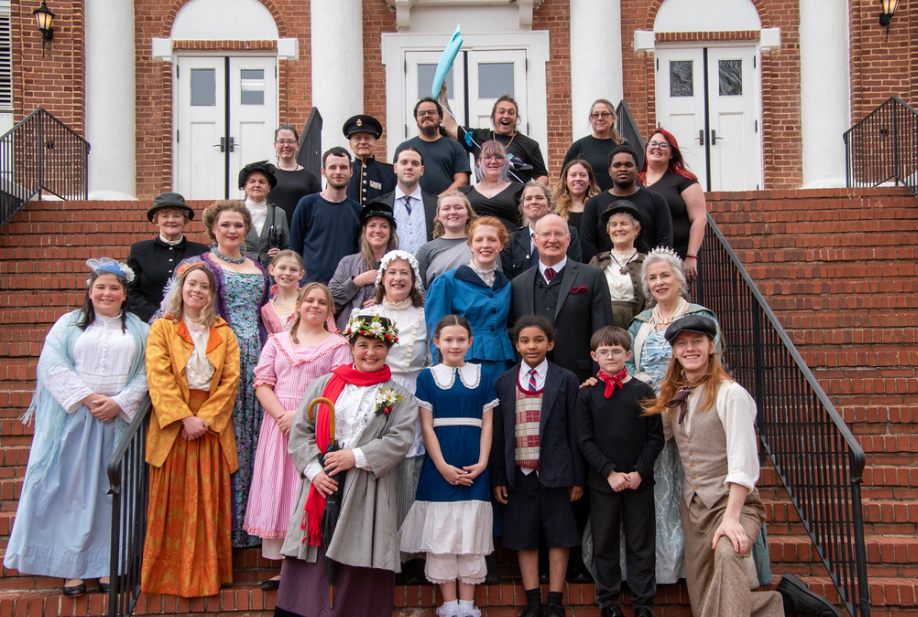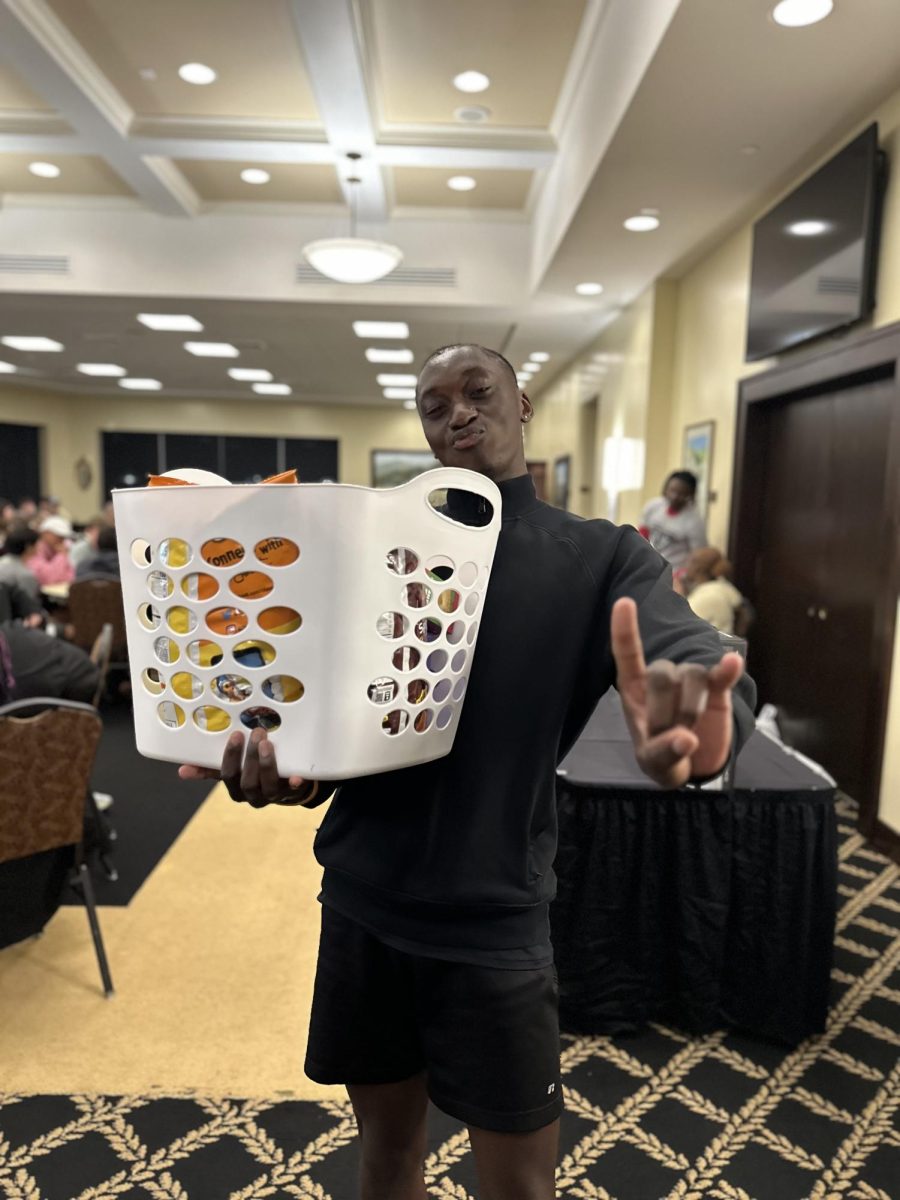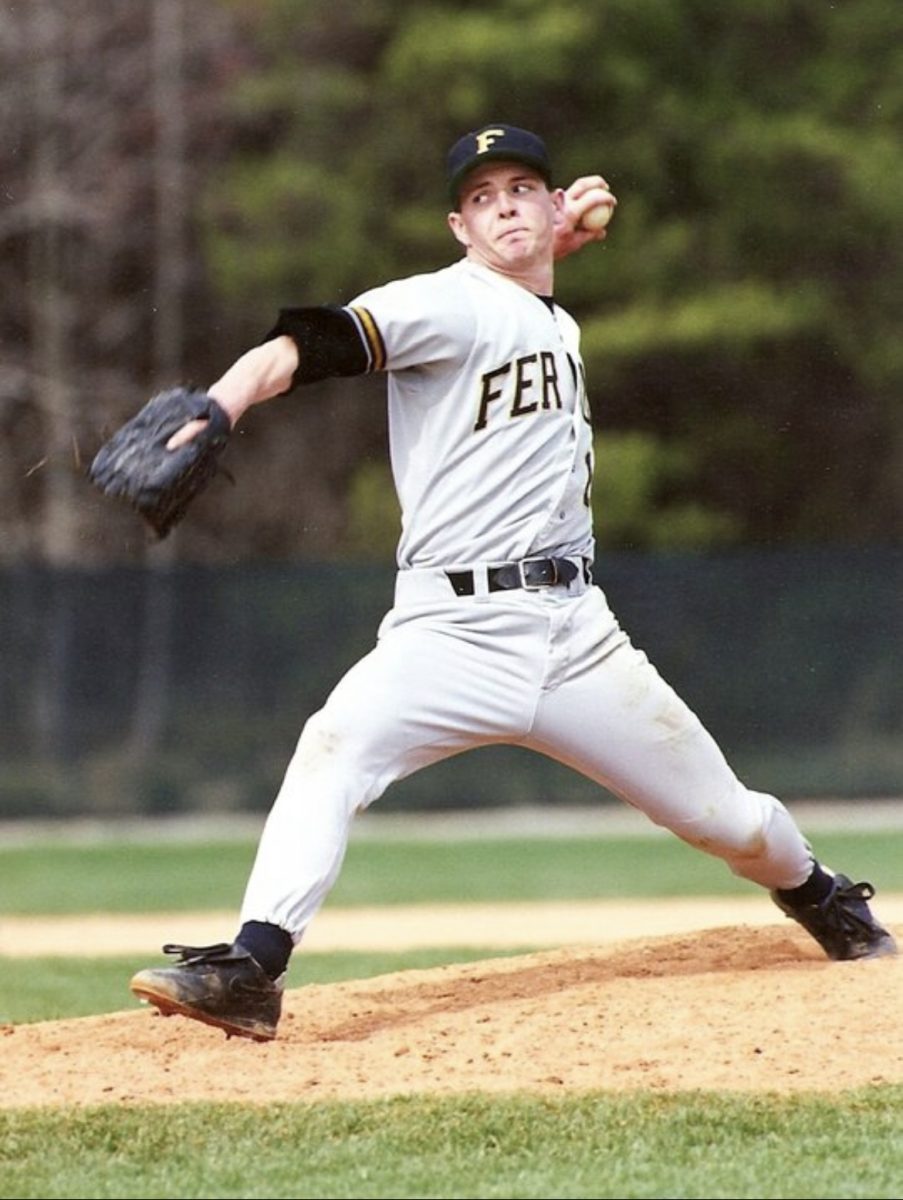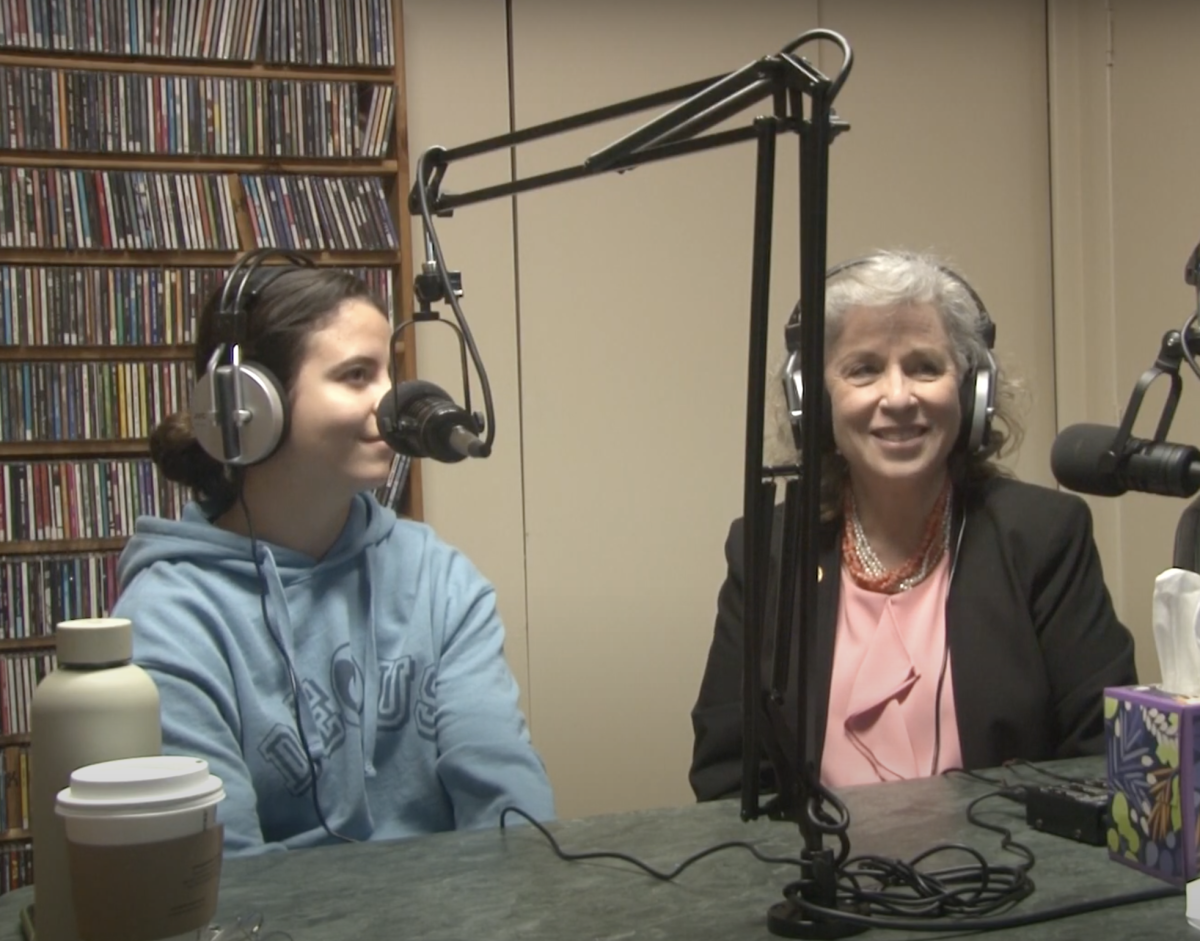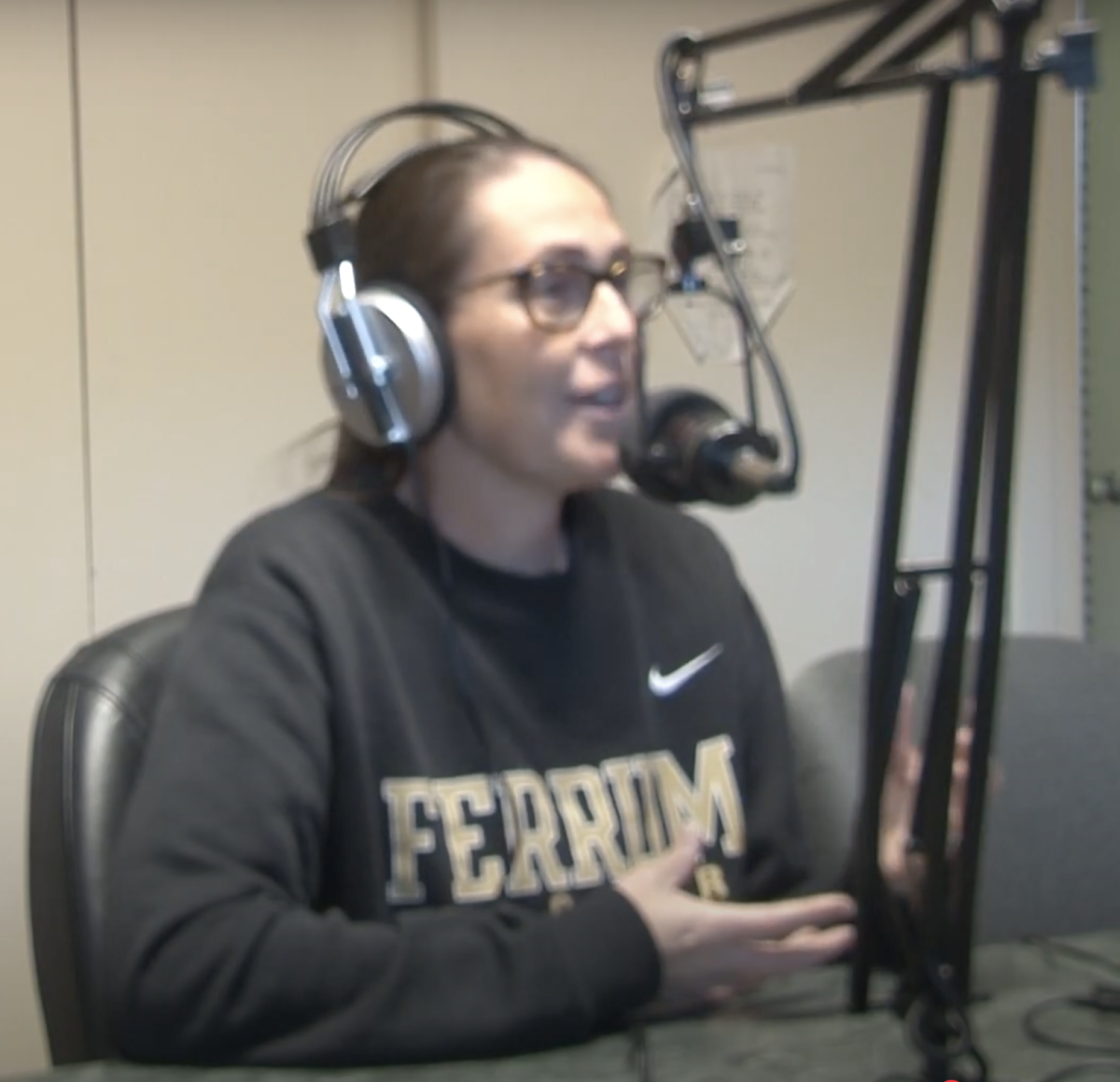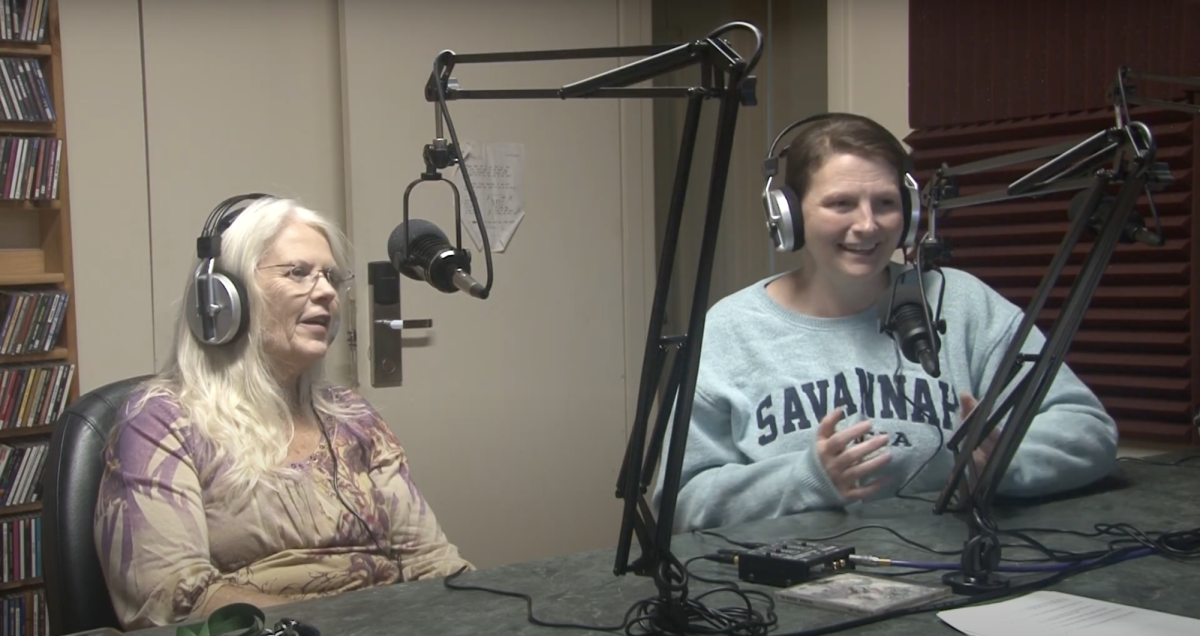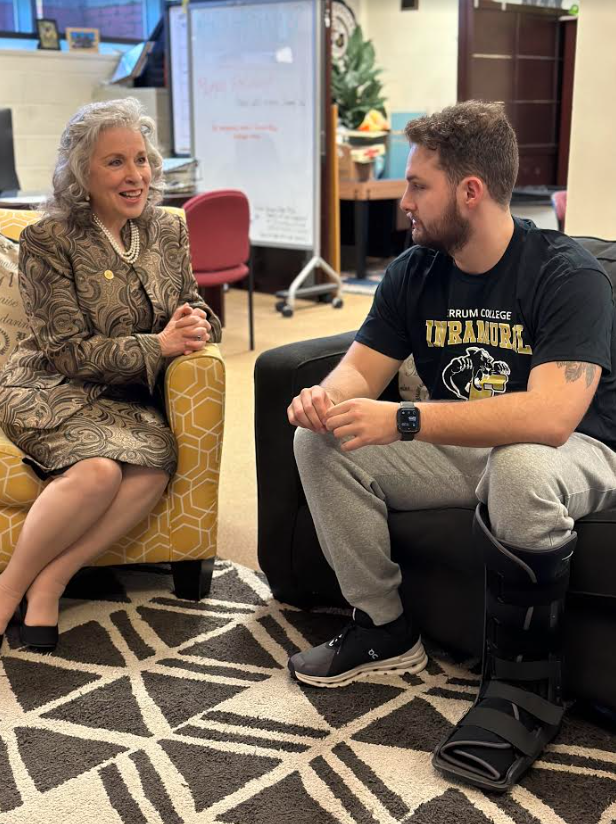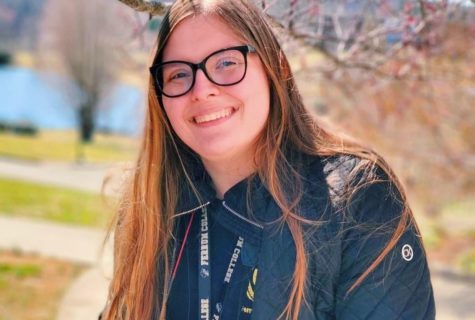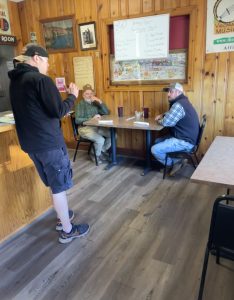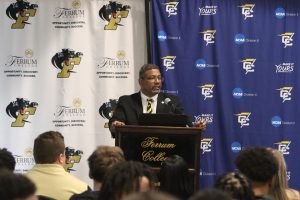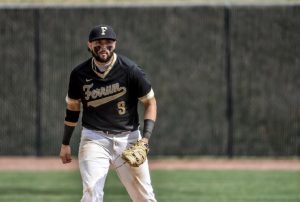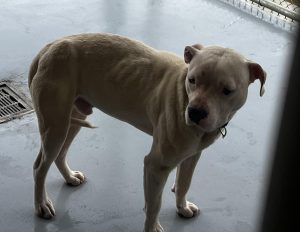From Refugee to President
Mirta Martin plans to be the change for Ferrum
At left, Mirta Martin, interim president, speaks with Conner Sides, senior.
April 4, 2023
After being restricted from basic human rights fleeing Cuba to Spain to the United States as a refugee, Mirta Martin has come to take on the role of the college’s interim president.
One month in, she already has plans for the college and has adapted to the atmosphere after getting to meet a lot of the Panther Nation.
“I’ve never seen a community who’s so welcoming, so wanting to be a part of a family as this community,” Martin said.
Already, Martin has spoken to different organizations, faculty, staff, and students to garner new additions and ideas to bring to the campus.
“I was very impressed by Dr. Martin’s energy and tenacity for change, and I feel very empowered to enact change, as well as the support from her to do so,” said Conner Sides, senior, and President of the Student Government Association (SGA). “My only downside is I will only get to work with her for one semester, but I’m excited to see the change she brings.”
Martin has also challenged the faculty under the leadership of the Vice President of Academic Affairs, Kevin Reilly, to launch industry badges.
“Badges are a visual representation of skills acquired in the classroom,” Reilly said.
Martin said often, there is a disconnect between the language of academics and the language of industry. Badges will bridge that gap. For students, that is huge because the algorithms created by the industry to identify prospective employees will now favor Panther graduates.
“Depending on what major or what course you take, you could end up with a badge in areas like welding, CISCO certification, OSHA Certification, Office 365 Certification, editing, budgeting, leadership, and teamwork, to name a few,” Martin said.
Faculty have looked at courses with industry-needed skills so students can earn an electronic industry badge upon course completion.
“I am excited that we have over 100 proposed badges so far, with more to come,” Reilly said.
Martin also wants to be involved with everyone on campus as much as possible. She plans to open up the President’s House where anyone can stop by.
“That house is for everybody, and I’ll be hosting student groups, faculty, staff, alumni, and donors,” Martin said. “The light on the porch means I’m there. That’s an invitation for any and all to stop by to say hello, to give me a hug, or to tell me what I don’t what to hear since this is the only way I can resolve issues.”
She also has her personal cell number and email ([email protected]) rather than the [email protected] email address on her business card and on her email.
“I want to hear from you, I want to answer your emails. I don’t want somebody answering it for me,” Martin said. “If I am saying to you that I am available, that I want to be part of your family, that I want you to let me into your life, I need to be accessible.”
Along with the newly planned initiatives and being involved with everyone, Martin also has a vision for the campus to become a support system and create growth for all students.
“I want Ferrum College to be the destination of choice for the next generation of leaders who seek a superb education provided by second-to-none faculty and supported by wonderful staff,” she said.
The only way to do this, Martin said, is to help her spread the word about the college.
“This is a special place, and I want, and I need for everyone to open their mouth and talk about this rare jewel,” she said.
Prior to arriving in the states, Martin became a Cuban refugee at age 6. While she does not remember much, she does have some memories.
“My grandmother, my sister, and I were allowed to leave the island by the Communist Regime when I was 6. So my memories are those that most children that age may have. They are memories about family,” Martin said.
One of the family members Martin remembers was her grandfather. While living under a Communist regime, the citizens of Cuba were only allowed one pair of shoes. As the shoes tore apart, Martin’s grandfather would trace her foot around a piece of cardboard. He would then cut it up and place it in her shoes to cover the hole that would form in the soles.
“I remember that hole getting bigger and bigger,” Martin said. “It’s a sad memory, but what is more sad is the realization that there are people in the world today who, 50 years after the fact, still live like that–not having daily needs we consider basic in the U.S.–like owning a pair of shoes. Still, those are wonderful memories of a time gone by because it’s a memory about family, about spending time with a grandfather.”
Also, she remembers that citizens in Cuba were restricted from practicing their beliefs and having any human rights. Under the Strategic Plan, citizens were restricted from expressing their beliefs, such as religion.
“The first thing they did was to criminalize going to church. Many families had priests and pastors in their homes, but they were often discovered. Entire families were thrown in jail. It was a very successful strategy to demoralize the people,” Martin said. “The other important value for the Cuban people was family, and the Castro regime focused heavily in tearing apart families.”
Castro’s revolution was supposedly sold as a means to bring equality to the people. He self-identified as a socialist. Soon after taking power, he aligned his strategies with the Soviet Union, and embraced the Marxist, communist ideals. Castro then closed the island for people to come in and out of the country. There was but one way to leave the island, and that was to ask the government for permission.
“The people who wanted to leave had to travel to the ministry of the interior, and the male head of the family would write down the names of all the members of their family and all their birthdays. Now, the government, with great ease, had your family tree.”
With this information, the government picked who was allowed to leave the island.
“They did it in such a fashion to separate families, and often, the government’s choices made it difficult for families to leave,” Martin said.
For example, if a permit came for a father and child to leave the country, the father would often choose not to leave. Women did not normally work outside of the home; therefore, if the breadwinner left, how would the wife and other remaining family live? Where would their food come from? Faced with such difficult decisions, individuals would often choose to remain behind so their families would not starve. They were then often detained for life.
“In our case, the permit came first for my grandmother, for my sister, and me,” Martin said. “We were shipped via Spain. The communists decided where and when they would ship you out of the country. You didn’t pick.”
Martin’s grandmother left Cuba accompanied by two young girls: Martin was 6, and her sister was 5.
“While terrified to leave the island with no money, no clothes, and no place to live, my grandmother also knew that if she stayed behind, the rest of the family would not leave because then my sister and I would not be allowed out for at least another three years,” Martin said. “In a leap of faith, my grandmother picked us up so that we could have freedom.”
Before leaving, Martin and her travelers were placed in a glass room and separated from the rest of their loved ones.
“The memory of leaving Cuba as a six-year-old is something that I will never forget. It was the ultimate attack on our values, and the intent was to totally demoralize, to break people’s spirit,” Martin said. “Instead of allowing families who did not know whether they would ever see each other again the opportunity to be with each other during those last hours, the Communists purposely kept us apart.”
Martin then paused, brought to tears as she retold her story.
All she knew during that time was that she would be going to a different place with only the clothes they had on their backs.
“I didn’t understand what was happening; I didn’t understand why it was that we were separated by this glass. I didn’t understand why it was that I couldn’t touch my parents, or my grandfathers, or my brothers, or my cousins,” Martin said. “I just knew what I had been told: ‘You get on a plane, and you go with your grandmother.’”
After leaving the airport, Martin arrived in Madrid and was taken in by a convent of nuns.
After eight years in the convent and waiting and thinking her family would follow, Martin’s grandmother was told the one chance to facilitate the family’s departure from Cuba was to travel to the U.S. with her grandchildren.
“The American Embassy told my grandmother that if we came to the states as American citizens and as minors, we could perhaps get our family out,” Martin said.
While going through all of this, and still today, Martin looked up to her grandmother as a leader in her life who raised her into who she is today.
“My grandmother was that guiding light that gave me my values. She was my mother, brother, sister, father, mentor, and friend at any one time,” Martin said. “My life today, who I am today, is the result of her great sacrifice of leaving her daughter, leaving her husband, leaving her family. She did it to give us freedom.”
Arriving in the states, Mirta Martin did not speak any English, so she had to learn. Now she speaks three other languages fluently. Spanish is her native language, French is her second language, and with Spain’s proximity to Portugal, she learned Portuguese. She also learned to speak Italian and German but is not as fluent as she used to be.
“I still understand them, but since I don’t speak those languages often, once I become re-immersed, though, then it comes back,” Martin said.
When she arrived in the United States, Martin worked full-time while also going to school. Her grandmother worked two full-time jobs during the week. On Sundays, after going to church and working all week, they would then go and clean homes. It was the money they earned cleaning homes that they used to purchase food.
“There were times that food was scarce,” Martin said. “We always had something to eat but sometimes not enough, so I remember going hungry.”
This experience inspired and still inspires Martin to constantly fight food insecurities for all students.
“I say to students I need to know what I don’t want to hear, and part of that may be that ‘my roommate doesn’t have food,’” Martin said. “I also want to know if somebody is homeless; no kid is going to sleep in a car when I can put a roof over their head, it’s just not going to happen.”
Another way Martin’s grandmother was an influence was by encouraging her to continue her education beyond high school. While Martin’s grandmother wanted her granddaughter to receive a good education, Martin became concerned about how they were going to pay.
“A teacher took me under her wing, and she taught me how to apply to college, look for loans, grants, and scholarships,” Martin said. “At a time when I didn’t have the money, the teacher wrote the check for the application fee.”
That check was then attached to Martin’s application to Duke University, where she ended up studying Liberal Arts.
“I believe that they (the Liberal Arts) provide you a broad base of knowledge to be able to properly navigate the world, and they give you enough information and enough data to know a little about a lot of things,” Martin said. “It excites the soul; it’s that love of art, music, theater, English, literature, history, political science, psychology, that behavior of people, of languages and culture that really connect you with the world at large.”
Soon after graduating from Duke, Martin married her college sweetheart, John Martin, who she met the first week of her freshman year.
“Do what I say and not what I did,” said Martin, laughing. “Marriage right out of college has worked out very well for me, obviously, but it was difficult. After I was married, I started to work in a bank, and I started to climb corporate but had to also take care of a very young family, while also going to graduate school. It was not easy.”
During this time, Martin’s grandmother encouraged her to continue her education. This led her to later on receiving her MBA at the University of Richmond and advancing to receiving her Ph.D. in Business Strategy at Virginia Commonwealth University.
“I saw the value of that education because that education opened doors for me in the bank and throughout life,” Martin said.
During this time, Martin had two children–a son, and a daughter. At the height of her career, her daughter was 4 and her son was 1. Due to having to travel, Martin and her husband did what they thought was best for their children.
“I left it (the bank) to raise my family, my son, and my daughter, because we had no one else,” Martin said. “My husband was running a family business, and we felt that we needed to give our children our faith and our values, and there was nobody else that could do it.”
Later on, the then-president of Averett College Frank Campbell–who also knew Martin–approached her and was asked to design an MBA for executives. This program allowed people that needed an MBA to obtain this education in less than 18 months. Students went to school one day a week, from 6 p.m. to 10 p.m. year-round. Most courses were six weeks in length.
“I had the privilege to become the architect of the first executive fast-track MBA in the Commonwealth of Virginia, a program that opened doors of opportunity for hundreds and thousands of people,” Martin said.
After living in Richmond since her marriage, Martin traveled often to the Appalachian side of the Commonwealth with her husband.
“We used to travel this way up the Blue Ridge Mountains. My husband’s family comes from a very rural environment as well,” Martin said. “Even though I grew up in Spain, very cosmopolitan, it’s the kindness and the work ethic of people that always drew me to rural areas.”
While working in other states at other institutions since 2009, Martin had always sought to return home to the Virginia. She was elated to receive a phone call offering her the position of interim president here.
“I felt called to come to Ferrum. I’ve been in the Commonwealth for 40 years,” Martin said. “I always knew the important role Ferrum College played in the lives of the people who attended the school.”
Martin served as president of two other institutions outside the Commonwealth of Virginia during a 10-year period. Since she had not lived in Virginia during that time, it was important for her to visit the college prior to committing to take the position.
“I needed to come and set foot on campus,” Martin said. “I couldn’t look at somebody in the face and say, ‘Yes this is where I need to be,’ if I didn’t know this is where I needed to be.”
She felt immediately at home when she arrived.
“The first thing I saw was the Chapel and the cross on top of the steeple, and I felt as though my heart jumped out of my chest,” Martin said. “Then I turned onto campus, and I felt this inner peace like there was a dome of protection and inspiration over this campus. I knew I was home.”
One of the things that Martin is very passionate about is faith, which is one of the reasons she also felt called to serve the campus.
“I always wanted to serve in a faith-based institution where I could live the values and the faith that guides my life. It’s who I am,” Martin said. “God guided me to Ferrum College–for such a time as this.”
Since then, Martin has been living the closing line of her emails: Onward and Upward!
A segment that appears in the Iron Blade is called “Quad-Talk” where students walk across the quad and answer 25 questions. Martin participated in giving her answers:
Name: The American version of it is Mirta Martin
Hometown: Richmond, VA
Hobbies: Spending time with my Ferrum kids
Favorite Food: Paella
Favorite Quote: “Be the change that you want to see in the world,” Gandhi
Favorite Movie: The Cutting Edge
Life Goal: To make a difference upon others
#1 Song on Playlist: “Mary Did You Know?” I love Christmas
Favorite Drink at Panther Grounds: Diet Coke, I don’t drink
Favorite Social Media: I’m old-fashioned, Facebook.
Favorite Color: Blue, and now black and gold
If you had to listen to one artist for the rest of your life who would it be: Plácido Domingo, who is a Spanish tenor
Dream Place to Live: I’m living it right now, in Heaven, in Ferrum College, Virginia
Sweet or Savory: Savory
Dream Car: My dream car was the first car that I had, a Mazda RX-7, I loved that little car
Wheels or Doors: Wheels, it gets me places
Would You Skydive: If challenged I would, but it would not be my first choice, I don’t like free floating
Describe yourself in three words: Religious, Compassionate, and Driven
Early Bird or Night Owl: Night Owl
Biggest Role Model: My grandmother
What Super Power Do You Wish You Had: I want to be genie, to blink my eyes and transport myself so I can be omnipresent everywhere and I can help people
Best Thing About Ferrum: Its people

